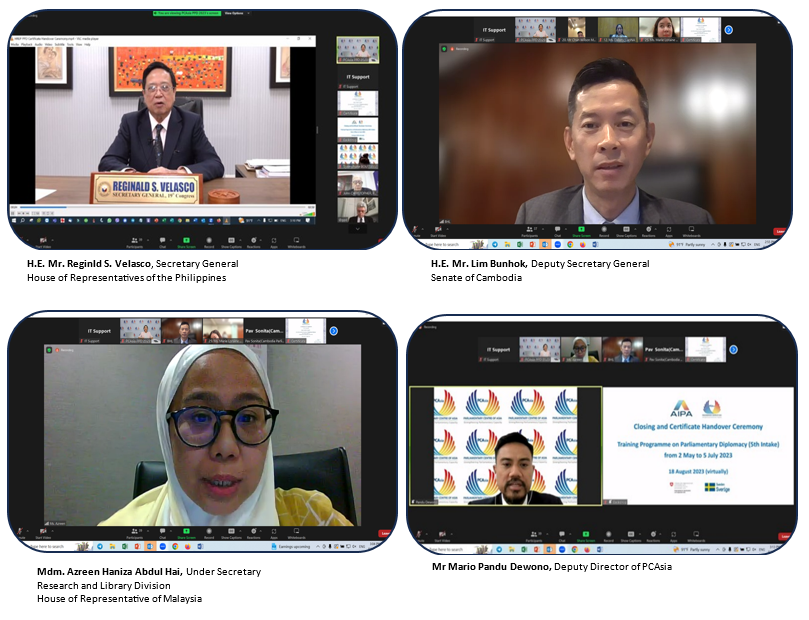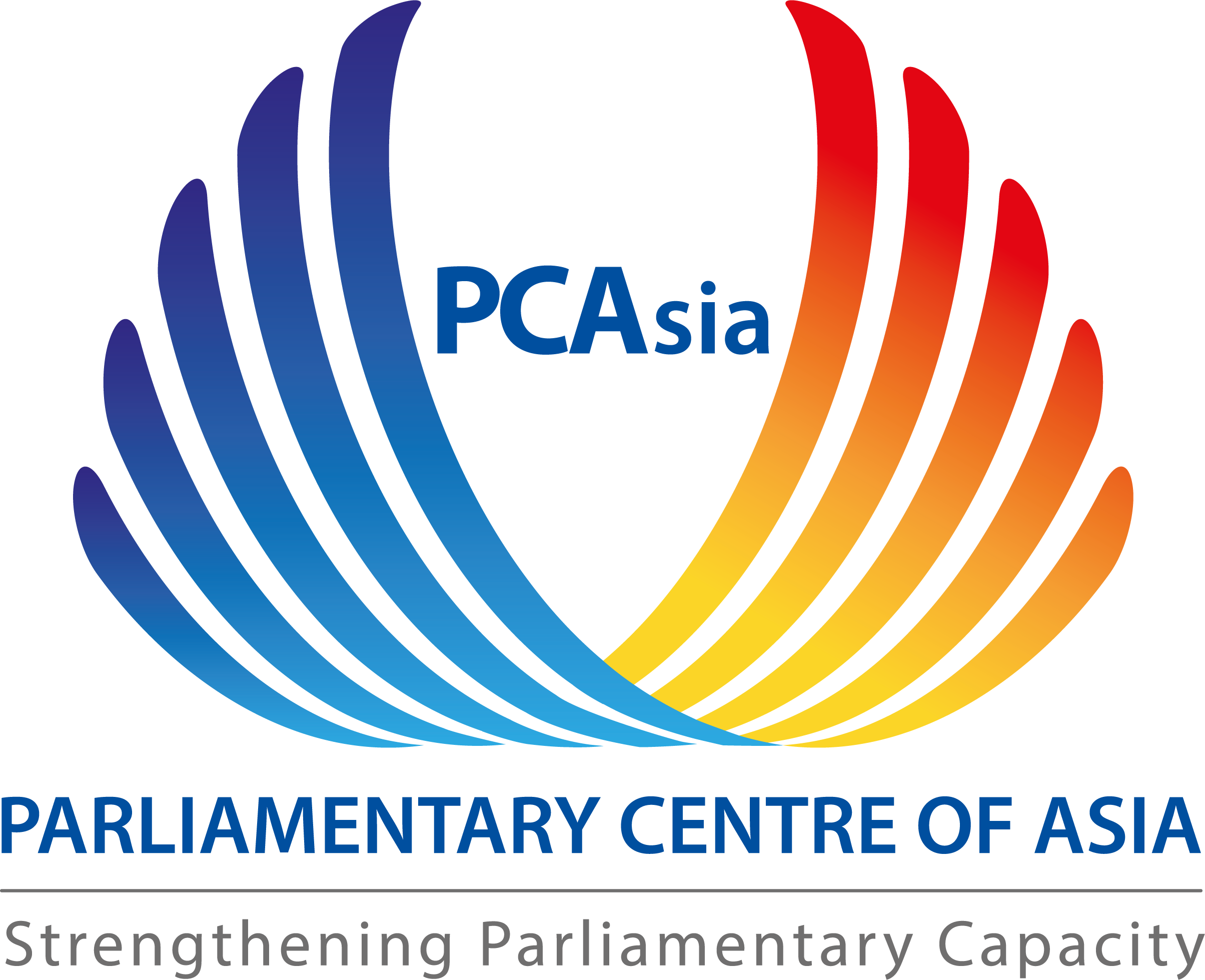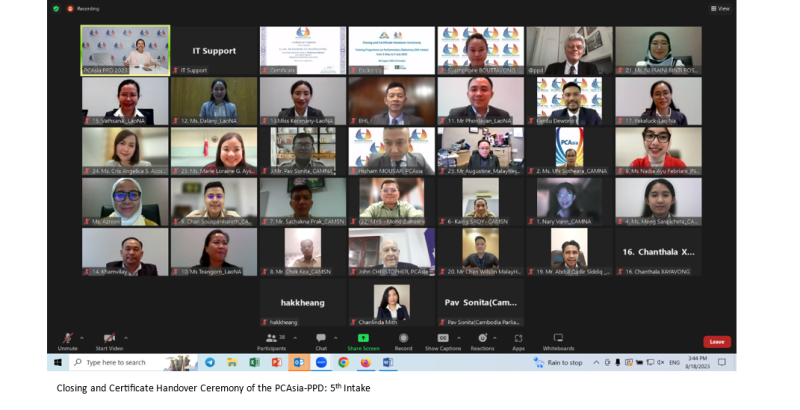After 10 weeks of training from 2 May to 5 July 2023, the 5th Intake of the Programme on Parliamentary Diplomacy (PCAsia-PPD) was concluded. Consisting of three modules delivered in hybrid mode, the programme involved 26 trainees from AIPA Member Parliaments, including Cambodia, Indonesia, Laos, Malaysia, and the Philippines. The ceremony was held on 18 August 2023 in recognition of their efforts, commitment, and active engagement, which contributed to the successful completion of their training. It was attended by distinguished guests and representatives from the Parliaments of Cambodia, Malaysia and the Philippines, as well as PCAsia representatives including Professor Michel FOUCHER, former Ambassador and PPD Programme Director, Mr Xavier NUTTIN, Vice-Chair of PCAsia Board of Directors, and Mr Mario Pandu DEWONO, Deputy Director of PCAsia.
The aim of the PCAsia-PPD is to provide trainees with knowledge, skillsets and techniques that enable them to better support their Parliamentarians in their increasing role in international affairs. This includes, but is not limited to, knowledge of geopolitics, international relations, international law, skills in drafting memoranda, providing country positions, and drafting inter-parliamentary resolutions, as well as negotiation techniques.
Professor Michel FOUCHER brought up an encouraging aspect of the programme, which is the feedback by the trainees confirming that all of them consider the programme as useful or highly useful, and that they will be able to apply what they learned during the training in their work. He also pointed to the challenge of learning from distance, while praising the ability of the participants to adapt. He continued, noting how their success only exemplifies the importance of the topic of ‘connectivity’, which was selected as the subject-matter of focus for this intake, and which shares its place in regional agenda with priorities such as migration, gender, security and safety, climate change, health, and governance. He ended his remarks with an emphasis on the role of Parliaments in maintaining international relations amidst a multitude of challenges, using parliamentary diplomacy.


Trainee representatives delivered remarks centering on their appreciation for the programme and their thanks to the experts and facilitators from PCAsia-PPD for their support throughout the training. They explained how they would utilise their new knowledge and skillsets in their parliamentary work. Furthermore, they pledged to maintain the spirit of friendship and networking forged over the length of the programme to contribute towards efforts to promote peace and cooperation, transcending regional differences.
H.E. Mr. Lim Bunhok, Mdm. Azreen Haniza Abdul Hai, and H.E. Mr. Reginld S. Velasco, representatives from the Parliaments of Cambodia, Malaysia and the Philippines, respectively, shared congratulatory remarks with the successful trainees. , In particular, speakers noted in common that the training programme had been instrumental not only in enhancing knowledge and practical skills to assist their parliaments but also in providing a platform for long-lasting networks and connections across Parliaments in the region, which itself is a concrete form of parliamentary diplomacy.
Mr Mario Pandu DEWONO, Deputy Director of PCAsia, on behalf of the Executive Director, Mr Dararith KIM YEAT, thanked the implementing partners, financial partners, regional and international experts, and the PCAsia-PPD team for making the fifth intake of PPD possible. He discussed examples of parliamentary diplomacy through history, and noted how trainees from the previous PPD intakes are currently serving their Chambers to address key transnational issues. He concluded by emphasising PCAsia’s commitment to the ongoing improvement of this training programme, as evident in its continuous evolution over five intakes, to continue meeting the needs of Parliaments.
The aim of the PCAsia-PPD is to provide trainees with knowledge, skillsets and techniques that enable them to better support their Parliamentarians in their increasing role in international affairs. This includes, but is not limited to, knowledge of geopolitics, international relations, international law, skills in drafting memoranda, providing country positions, and drafting inter-parliamentary resolutions, as well as negotiation techniques.
Professor Michel FOUCHER brought up an encouraging aspect of the programme, which is the feedback by the trainees confirming that all of them consider the programme as useful or highly useful, and that they will be able to apply what they learned during the training in their work. He also pointed to the challenge of learning from distance, while praising the ability of the participants to adapt. He continued, noting how their success only exemplifies the importance of the topic of ‘connectivity’, which was selected as the subject-matter of focus for this intake, and which shares its place in regional agenda with priorities such as migration, gender, security and safety, climate change, health, and governance. He ended his remarks with an emphasis on the role of Parliaments in maintaining international relations amidst a multitude of challenges, using parliamentary diplomacy.
H.E. Mr. Lim Bunhok, Mdm. Azreen Haniza Abdul Hai, and H.E. Mr. Reginld S. Velasco, representatives from the Parliaments of Cambodia, Malaysia and the Philippines, respectively, shared congratulatory remarks with the successful trainees. , In particular, speakers noted in common that the training programme had been instrumental not only in enhancing knowledge and practical skills to assist their parliaments but also in providing a platform for long-lasting networks and connections across Parliaments in the region, which itself is a concrete form of parliamentary diplomacy.
Mr Mario Pandu DEWONO, Deputy Director of PCAsia, on behalf of the Executive Director, Mr Dararith KIM YEAT, thanked the implementing partners, financial partners, regional and international experts, and the PCAsia-PPD team for making the fifth intake of PPD possible. He discussed examples of parliamentary diplomacy through history, and noted how trainees from the previous PPD intakes are currently serving their Chambers to address key transnational issues. He concluded by emphasising PCAsia’s commitment to the ongoing improvement of this training programme, as evident in its continuous evolution over five intakes, to continue meeting the needs of Parliaments.


